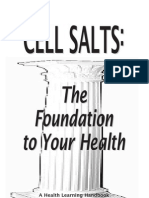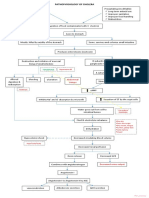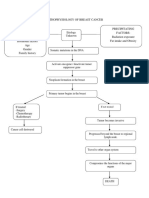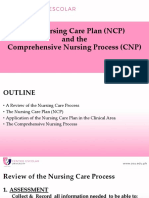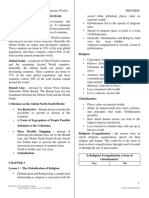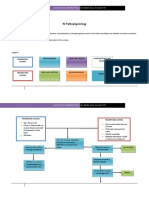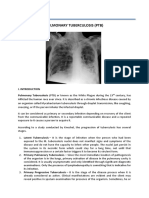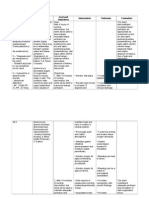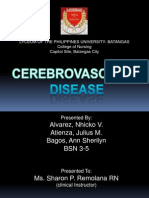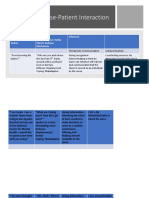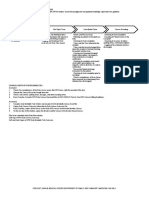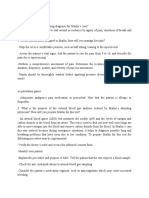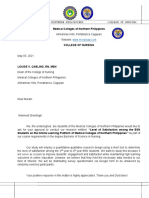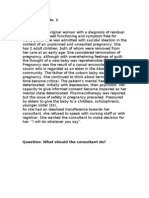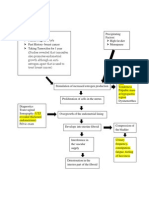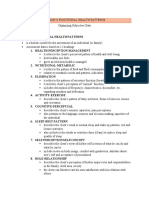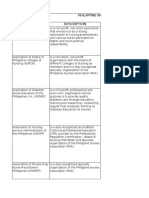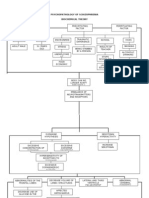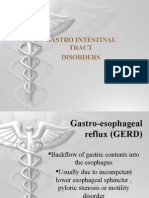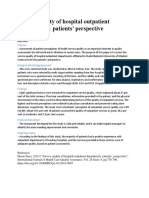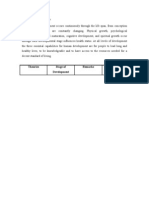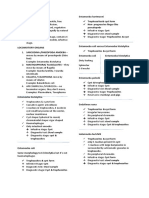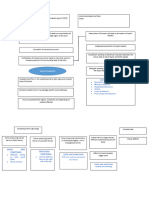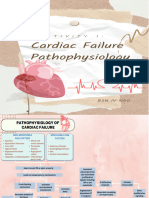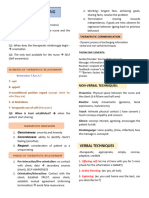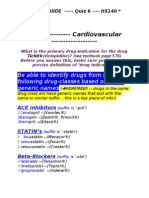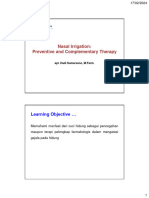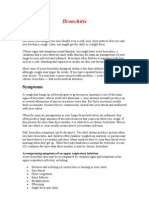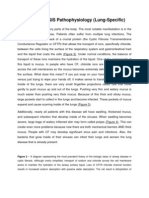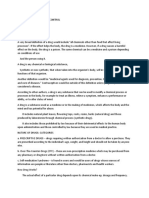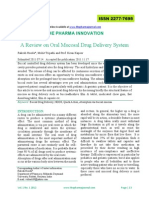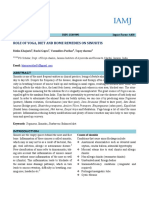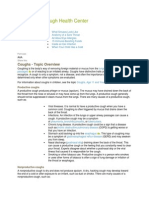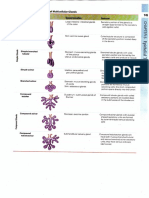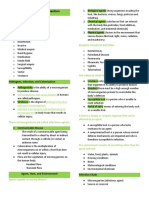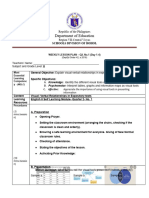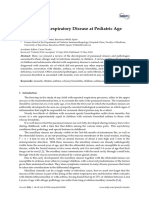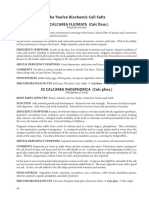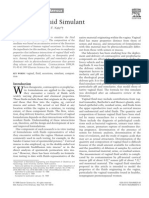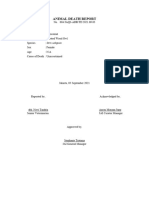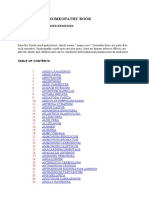Patophy of Pud
Patophy of Pud
Uploaded by
Clarence BravioCopyright:
Available Formats
Patophy of Pud
Patophy of Pud
Uploaded by
Clarence BravioOriginal Description:
Original Title
Copyright
Available Formats
Share this document
Did you find this document useful?
Is this content inappropriate?
Copyright:
Available Formats
Patophy of Pud
Patophy of Pud
Uploaded by
Clarence BravioCopyright:
Available Formats
SCHEMATIC PATHOPHYSIOLOGY
Contributing Factor: Precipitating Factors:
Diet: Excessive caffeine intake Age: 50-70 years old
Increase hydrochloric acid (HCL) production
Excessive alcohol intake
Low socioeconomic status
Smoking
Unclean foods and water
Stress factors Unsanitary living condition
Type “0” blood Irritation to the lining of (mucosal), proximal
Genetic predisposition of small intestines
Gastric acid secretion Presence of Helicobacter Pylori infection
Ulcerogenic substances (NSAID’s e.g aspirin,
ibuprofen)
Excessive production of Entry of H.pylori through
Excessive NSAID use
Hydrochloric acid (HCL) ingestion
Irritation of the lining Renders the mucosa Toxicity to gastric
(mucosal) of the stomach, more vulnerable to acid COX-1 inhibition epithelial cell
duodenum, proximal of damage by disrupting
small intestines mucous layer, liberating
enzymes and adhering to
gastric epithelium.
Decreased
Imbalances between prostaglandins
protective mechanisms
Altered gastric
and the acid-pepsin
secretion
proteolytic enzymes
Decreased gastric
Tissue injury in the mucous production
stomach/ Ulcers
Can damage mucosal barrier
Can cause activation of inflammatory process
Decreased function of mucosal cells
Decreased quality of mucus
Loss of tight junction between cells
Back diffusion of acid into gastric mucosa
Conversion of pepsinogen to Increased acid Formation of liberation of
pepsin secretion histamine
Further mucosal erosion Local vasodilation
Destruction of blood Stimulation of cholinergic
intramural plexus, causing muscle
spasm
Ulceration Epigastric pain Increased capillary permeability
Loss of plasma proteins
Mucosal edema
Bleeding in Bleeding in Loss of plasma into gastric lumen
Dyspepisia
esophagus stomach
Excessive
bleeding
Hematemesis (hemorrhage)
(Vomiting of
blood)
Blood passes through GI
Decreased oxygen tract becomes oxidized by
carrying capacity as HCl resulting in
manifested by
Blood gets decreased hgb and *Black tarry stool Pyloric
oxidized by hct level obstruction
HCl but
moves back
to esophagus
Pallor
Lightheadedness
Coffee-ground Weakness
emesis
You might also like
- Cell Salts RemediesDocument13 pagesCell Salts RemediesBeyond Medicine100% (8)
- Pharmacotherapy of CoughDocument51 pagesPharmacotherapy of CoughIqra Butt100% (3)
- Mineral Salts BookDocument17 pagesMineral Salts Bookfriasjus91% (11)
- Pathophysiology of Cholera PDFDocument1 pagePathophysiology of Cholera PDFRameshKrishnanNo ratings yet
- Ortho NCPDocument3 pagesOrtho NCPMarshin Thea CelociaNo ratings yet
- Pathophysiology of Breast Cancer: If Not TreatedDocument1 pagePathophysiology of Breast Cancer: If Not TreatedsteffiNo ratings yet
- DIABETES Nursing ManagementDocument11 pagesDIABETES Nursing ManagementKaloy KamaoNo ratings yet
- Reflection PaperDocument2 pagesReflection PapershanoiapowelllNo ratings yet
- Pathophysiology (Client Base) :: Predisposing Factors: Precipitating FactorsDocument1 pagePathophysiology (Client Base) :: Predisposing Factors: Precipitating Factorsleslie_macasaetNo ratings yet
- BSN 3a2 A - Chap 1 3Document32 pagesBSN 3a2 A - Chap 1 3Pollen Siega BunalNo ratings yet
- Annotated Group 2 Impetigo Concept Mapping 1Document30 pagesAnnotated Group 2 Impetigo Concept Mapping 1DHANE ANN CAMPOSANONo ratings yet
- NCP and CNPDocument37 pagesNCP and CNPDen TupasNo ratings yet
- Prepared By: Mr. Justin Paul D. Gallano Faculty Member - College of Arts, T.I.P. Manila © 2020 - Not For SaleDocument3 pagesPrepared By: Mr. Justin Paul D. Gallano Faculty Member - College of Arts, T.I.P. Manila © 2020 - Not For SaleMaeriel AggabaoNo ratings yet
- Pathophysiology Cushing S SyndromeDocument4 pagesPathophysiology Cushing S SyndromeMaria Luisa VillalunaNo ratings yet
- Ulcerative ColitisDocument9 pagesUlcerative Colitiskint manlangitNo ratings yet
- UTI (Urinary Tract Infection)Document9 pagesUTI (Urinary Tract Infection)Carson BirthNo ratings yet
- The Patient and His Illness A. Pathophysiology (Book Based)Document5 pagesThe Patient and His Illness A. Pathophysiology (Book Based)Edmar Francis SabileNo ratings yet
- IV PathophysiologyDocument5 pagesIV PathophysiologyJanedear Pasal100% (1)
- Case Pres Cerebrovascular DiseaseDocument34 pagesCase Pres Cerebrovascular DiseaseADRIATICO JAROSLUVNo ratings yet
- 500 Medical Surgical Sample QuestionDocument323 pages500 Medical Surgical Sample QuestionElizabella Henrietta TanaquilNo ratings yet
- Path o PhysiologyDocument9 pagesPath o PhysiologyKyle Ü D. CunanersNo ratings yet
- Community Acquired Pneumonia PathophysiologyDocument3 pagesCommunity Acquired Pneumonia PathophysiologyAhmad SyahirNo ratings yet
- COPAR Tally SheetDocument3 pagesCOPAR Tally SheetAnna SarmientoNo ratings yet
- Case Study FormatDocument5 pagesCase Study FormatEden OlasabNo ratings yet
- Tramadol, Ketorolac, EterocoxibDocument4 pagesTramadol, Ketorolac, EterocoxibEric de JulianNo ratings yet
- RLE314 CU4 MedicationDocument7 pagesRLE314 CU4 MedicationVAL ASHLIE ACEBARNo ratings yet
- Group 5 - Experiment No.10 - Culture and SensitivityDocument11 pagesGroup 5 - Experiment No.10 - Culture and SensitivityPMG BrightNo ratings yet
- Case Study Pulmonary TuberculosisDocument19 pagesCase Study Pulmonary TuberculosisJester GalayNo ratings yet
- Nursing DiagnosisDocument5 pagesNursing DiagnosisGeovanni Rai HermanoNo ratings yet
- Lourlyn's Angels?Document27 pagesLourlyn's Angels?lovelove DayoNo ratings yet
- Choledecholithiasis Case StudyDocument8 pagesCholedecholithiasis Case StudyYuuki Chitose (tai-kun)No ratings yet
- Lyceum of The Philippines University - Batangas CollegeDocument120 pagesLyceum of The Philippines University - Batangas CollegeKMNo ratings yet
- NPI Process RecordingDocument7 pagesNPI Process RecordingChristine ElbanbuenaNo ratings yet
- Open I Tibia Fibula (R) Lacerated Wounded Leg: Our Lady of Fatima UniversityDocument21 pagesOpen I Tibia Fibula (R) Lacerated Wounded Leg: Our Lady of Fatima UniversityPOTENCIANA MAROMANo ratings yet
- EAMC DFCM OPD Charting Guidelines As of March 2022Document19 pagesEAMC DFCM OPD Charting Guidelines As of March 2022Adrian MaterumNo ratings yet
- Chest Injury QuestionsDocument3 pagesChest Injury QuestionsNicole Genevie MallariNo ratings yet
- Comm Letter Infromed Consent QuestionnaireCV 1Document14 pagesComm Letter Infromed Consent QuestionnaireCV 1mark OrpillaNo ratings yet
- CASE STUDY PheumoniaDocument5 pagesCASE STUDY PheumoniaEdelweiss Marie CayetanoNo ratings yet
- BARANDINO, Jia Laurice (Gouty Arthritis)Document18 pagesBARANDINO, Jia Laurice (Gouty Arthritis)Deinielle Magdangal RomeroNo ratings yet
- Case Study SSSSDocument37 pagesCase Study SSSSsplakener100% (1)
- Nasopharyngeal PathophysiologyDocument3 pagesNasopharyngeal PathophysiologyMichael Anthony ReginaldoNo ratings yet
- Case Report No1Document9 pagesCase Report No1Menn PetchuayNo ratings yet
- Case Study Medical WardDocument14 pagesCase Study Medical WardJoshNo ratings yet
- Pathophy NCADocument1 pagePathophy NCAKaren ValdezNo ratings yet
- Gordon's Functional HealthDocument2 pagesGordon's Functional HealthReina ArabelleNo ratings yet
- Presentation Thyroid ScanDocument20 pagesPresentation Thyroid ScanMuhammad Safwan Ahmad FadzilNo ratings yet
- Philippine Nursing Organizations Org Name DescriptionDocument8 pagesPhilippine Nursing Organizations Org Name DescriptionShehada Marcos BondadNo ratings yet
- Acute Appendicitis Group CDocument40 pagesAcute Appendicitis Group CHeart TolenadaNo ratings yet
- Rle Module Rle Unit Week: Bachelor of Science in Nursing: Rle NCM 105 - Psychiatric NursingDocument6 pagesRle Module Rle Unit Week: Bachelor of Science in Nursing: Rle NCM 105 - Psychiatric NursingAllisson BeckersNo ratings yet
- Kabiven: (Amino Acids, Electrolytes, Dextrose and Lipid Injectable Emulsion), For Intravenous UseDocument24 pagesKabiven: (Amino Acids, Electrolytes, Dextrose and Lipid Injectable Emulsion), For Intravenous UseDivine Mercy De JulianNo ratings yet
- Psycho Pathology of SchizophreniaDocument2 pagesPsycho Pathology of SchizophreniaDavid D. AdsuaraNo ratings yet
- Anemia Pathophysiology All in 1 by Francis OliverosDocument3 pagesAnemia Pathophysiology All in 1 by Francis Oliverosfrancis00090No ratings yet
- GitDocument302 pagesGitjgcriste100% (7)
- COPARDocument12 pagesCOPARGlenn Asuncion PagaduanNo ratings yet
- Service Quality of Hospital Outpatient Departments: Patients' PerspectiveDocument2 pagesService Quality of Hospital Outpatient Departments: Patients' Perspectivelouie john abilaNo ratings yet
- V. Developmental DataDocument6 pagesV. Developmental DataTrixie Al MarieNo ratings yet
- Pathophysiology of Transitional Cell CarcinomaDocument10 pagesPathophysiology of Transitional Cell CarcinomaJheanAlphonsineT.MeansNo ratings yet
- Cefoxitin and Ketorolac Edited!!Document3 pagesCefoxitin and Ketorolac Edited!!Bryan Cruz VisarraNo ratings yet
- Pa Tho Irritable Bowel SyndromeDocument1 pagePa Tho Irritable Bowel Syndromekaye0403No ratings yet
- Parasitology PartialDocument8 pagesParasitology Partialcayla mae carlosNo ratings yet
- New Insights in The Pathophysiology of Ovarian Cancer and Implications For Screening and Prevention PDFDocument19 pagesNew Insights in The Pathophysiology of Ovarian Cancer and Implications For Screening and Prevention PDFSafinaz InazNo ratings yet
- The Ride of Your Life: What I Learned about God, Love, and Adventure by Teaching My Son to Ride a BikeFrom EverandThe Ride of Your Life: What I Learned about God, Love, and Adventure by Teaching My Son to Ride a BikeRating: 4.5 out of 5 stars4.5/5 (2)
- Ventricular Septal Defect, A Simple Guide To The Condition, Treatment And Related ConditionsFrom EverandVentricular Septal Defect, A Simple Guide To The Condition, Treatment And Related ConditionsNo ratings yet
- Pathophysiology Brain TumorDocument2 pagesPathophysiology Brain TumorClarence BravioNo ratings yet
- Cardiac Failure PathophysiologyDocument5 pagesCardiac Failure PathophysiologyClarence BravioNo ratings yet
- Disaster in NursingDocument2 pagesDisaster in NursingClarence BravioNo ratings yet
- ICN Framework ReviewerDocument4 pagesICN Framework ReviewerClarence BravioNo ratings yet
- NP5 ReviewerDocument6 pagesNP5 ReviewerClarence BravioNo ratings yet
- HS140 Unit 6 Quiz Study GuideDocument9 pagesHS140 Unit 6 Quiz Study GuideCrystal MendiolaNo ratings yet
- Obstructive Sleep Aponea SurgeriesDocument638 pagesObstructive Sleep Aponea Surgerieswillyoueverlovemenk100% (3)
- Nasal Irrigation - Apt. Hadi Sumarsono M.farmDocument16 pagesNasal Irrigation - Apt. Hadi Sumarsono M.farmSulfani DarwisNo ratings yet
- BronchitisDocument6 pagesBronchitisNader Smadi100% (2)
- 59Document115 pages59James Driscoll100% (1)
- Colcom D 21 00172 R2Document131 pagesColcom D 21 00172 R2aleezaNo ratings yet
- Ch15 PPTDocument85 pagesCh15 PPTarnav3007sNo ratings yet
- Exercises For Eustachian Tube DysfunctionDocument4 pagesExercises For Eustachian Tube DysfunctionJuan MNo ratings yet
- Cystic Fibrosis PathophysiologyDocument5 pagesCystic Fibrosis PathophysiologyKim Enrico JumarangNo ratings yet
- Respiratory Gas Conditioning and Humidification: Andreas Schulze, MDDocument15 pagesRespiratory Gas Conditioning and Humidification: Andreas Schulze, MDSiska LesnussaNo ratings yet
- DocumentDocument21 pagesDocumentArturo Macaranas100% (1)
- A Review On Oral Mucosal Drug Delivery SystemDocument8 pagesA Review On Oral Mucosal Drug Delivery SystemPharmacognosy JournalNo ratings yet
- International Ayurvedic Medical Journal: Review Article ISSN: 2320 5091 Impact Factor: 4.018Document4 pagesInternational Ayurvedic Medical Journal: Review Article ISSN: 2320 5091 Impact Factor: 4.018bandgar123No ratings yet
- Cold, Flu, & Cough Health Center: Coughs - Topic OverviewDocument7 pagesCold, Flu, & Cough Health Center: Coughs - Topic OverviewJune DumdumayaNo ratings yet
- L Ffi: MulticellularDocument1 pageL Ffi: MulticellularCorban MihaiNo ratings yet
- Veterinary Internal Medicne - 2023 - Gareis - Correlation of Clinical and Radiographic Variables in Cats With Lower AirwayDocument10 pagesVeterinary Internal Medicne - 2023 - Gareis - Correlation of Clinical and Radiographic Variables in Cats With Lower Airwaylizandra116No ratings yet
- Fundamentals of Nursing Practice - MidtermDocument24 pagesFundamentals of Nursing Practice - MidtermShene Claire VigillaNo ratings yet
- Bohol Eng8 Q2 WK1Document9 pagesBohol Eng8 Q2 WK1RAYMOND ADLAONNo ratings yet
- Sinusitis and Respiratory Disease at Pediatric AgeDocument5 pagesSinusitis and Respiratory Disease at Pediatric AgeElfa RiniNo ratings yet
- Calalang Discharge PlanDocument3 pagesCalalang Discharge PlanLee JennyNo ratings yet
- Cell SaltsDocument8 pagesCell SaltsminunatNo ratings yet
- Bill Nye - S2E20 Respiration (Breathing)Document3 pagesBill Nye - S2E20 Respiration (Breathing)Victoria LowmanNo ratings yet
- MukosaDocument3 pagesMukosaMarf PennyNo ratings yet
- Vaginal Fluid SimulantDocument5 pagesVaginal Fluid Simulantluck2livNo ratings yet
- Owl NecropsyDocument3 pagesOwl Necropsykezia_stephanie_1No ratings yet
- Dr. Kessler'S Homeopathy Book: Polycrests and Other Remedies Index of DiseasesDocument375 pagesDr. Kessler'S Homeopathy Book: Polycrests and Other Remedies Index of DiseasesVishalNo ratings yet
- Study of Efficacy of Active Cycle of Breathing TechniquesDocument89 pagesStudy of Efficacy of Active Cycle of Breathing Techniquesnaga9390051055No ratings yet


